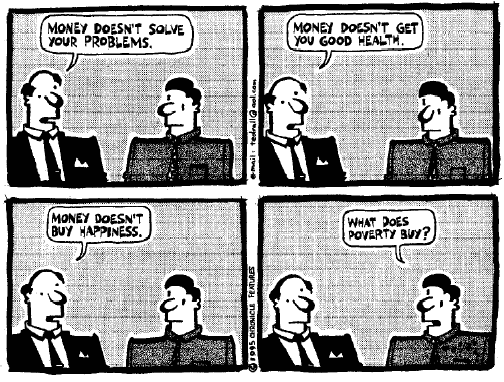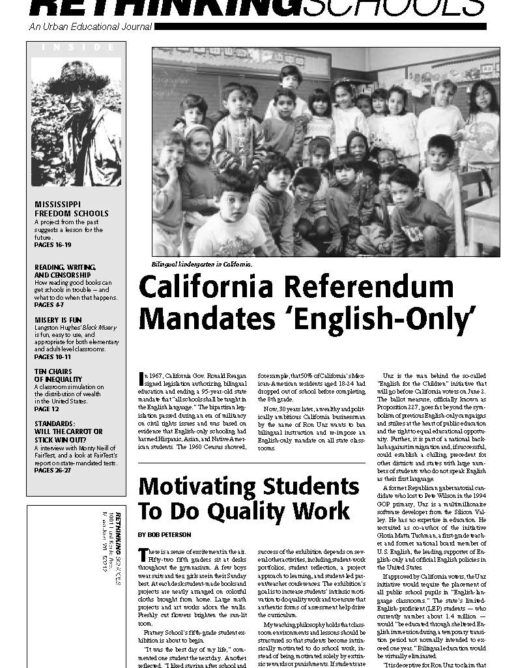MPS: Is This the Dark Before the Dawn?
A Rethinking Schools Editorial

The challenges are clear and dovetail with the problems facing urban school systems across the country: how to ensure that all students, and not just a select few, graduate from high school with the skills and learning needed to be successful participants in society. Milwaukee also has its own set of unique problems, not the least of which is a school board fond of micro-managing and too often silent on issues of equity and meeting the needs of all children.
The excitement may be less obvious. Actually, “excitement” is perhaps not the best word. It would be more accurate to say that Rethinking Schools is “hopeful.”
One key reason is that in recent months, there has been a coalescing of a number of community-based organizations focusing on MPS reform. Indeed, the level of organized community activity is almost — not quite, but almost — reminiscent of the beginning days of the movement to desegregate Milwaukee’s schools. The desegregation movement in the 1960s and 1970s was the last sustained period of massive community involvement in MPS and led to profound changes. It remains an inspiring example of how a popular movement can defeat narrow, entrenched, and powerful interests.
Unfortunately, today’s challenges are not so morally or educationally clear as the unabashed racism that led to blatant segregation in our city’s schools. But while the way forward remains murky, one thing is certain: any reform agenda developed in isolation from the community and imposed from the top down simply will not work.
Need for Unity
Among the many reform groups, there is a growing perception that for the sake of our children we must come together to forge a common agenda. Some of the groups have ties to the labor movement, some have ties to the business community, some are focused on parents and students, some are based in the religious community. Trust among the different sectors is fragile. But there are signs that positions may be in flux.
Within some sectors of the business community, for example, there seems to be a developing awareness that charter schools and vouchers will never be a panacea and that the bulk of Milwaukee’s children will remain in MPS — and cannot be abandoned. The teachers union appears to be willing to make some concessions to meet a long-standing concern and allow individual schools increased say over staff hiring. And the Milwaukee Journal Sentinel ran a front-page Sunday editorial that called for community responsibility for fixing MPS. These are hopeful signs.
Foundations of Reform
Rethinking Schools has no magic formula for success for MPS. But we offer the following — based in part on conversations with other organizations and on agendas they have developed — as essential foundations of reform.
- That reform be grounded in equity and a commitment to the success of all children. Unfortunately, concepts of equity and equality too often seem to be missing from reform discussions. Frequently, the approach to “problem” children is to throw them into alternative schools or programs instead of figuring out why the system doesn’t work for everyone.
- That reform be based on the realities of the classroom and centered on the needs of children. Issues such as improved teacher training, smaller classes, quality assessment, and curriculum reform are complicated and difficult to implement. Reforms must be judged on whether they improve learning — and support rather than penalize children who are having academic difficulties.
- That reform recognize that Milwaukee is not just a school system in crisis but a community in crisis. As “Education Week” recently noted, no other major city “collapsed” more than Milwaukee during the 1980s. We cannot make our schools work for all our students unless our city works for all our residents. It is unconscionable, for instance, that this city tolerates poverty levels so high that 81% of MPS elementary students qualify for free or reduced-price lunch.
- That reform must involve parents and community members. Parents and community must be key players in developing reform agendas. Further, reforms must be instituted which provide parents with ongoing power in the system — both on a district-wide and school level. Power and voice are essential to the communities of color for whom a quality education has so often been denied.
- That money, well spent, matters. The Milwaukee schools have less money and more responsibilities than most of their suburban counterparts. There must be a recognition that more resources are necessary to get the job done. Teachers, in turn, must recognize that money is a necessary but insufficient prerequisite for reform.
Teachers often tell students that they must learn to work together to solve problems — to analyze and think through a problem and not get discouraged if the answer is not readily apparent.
It’s good advice.

